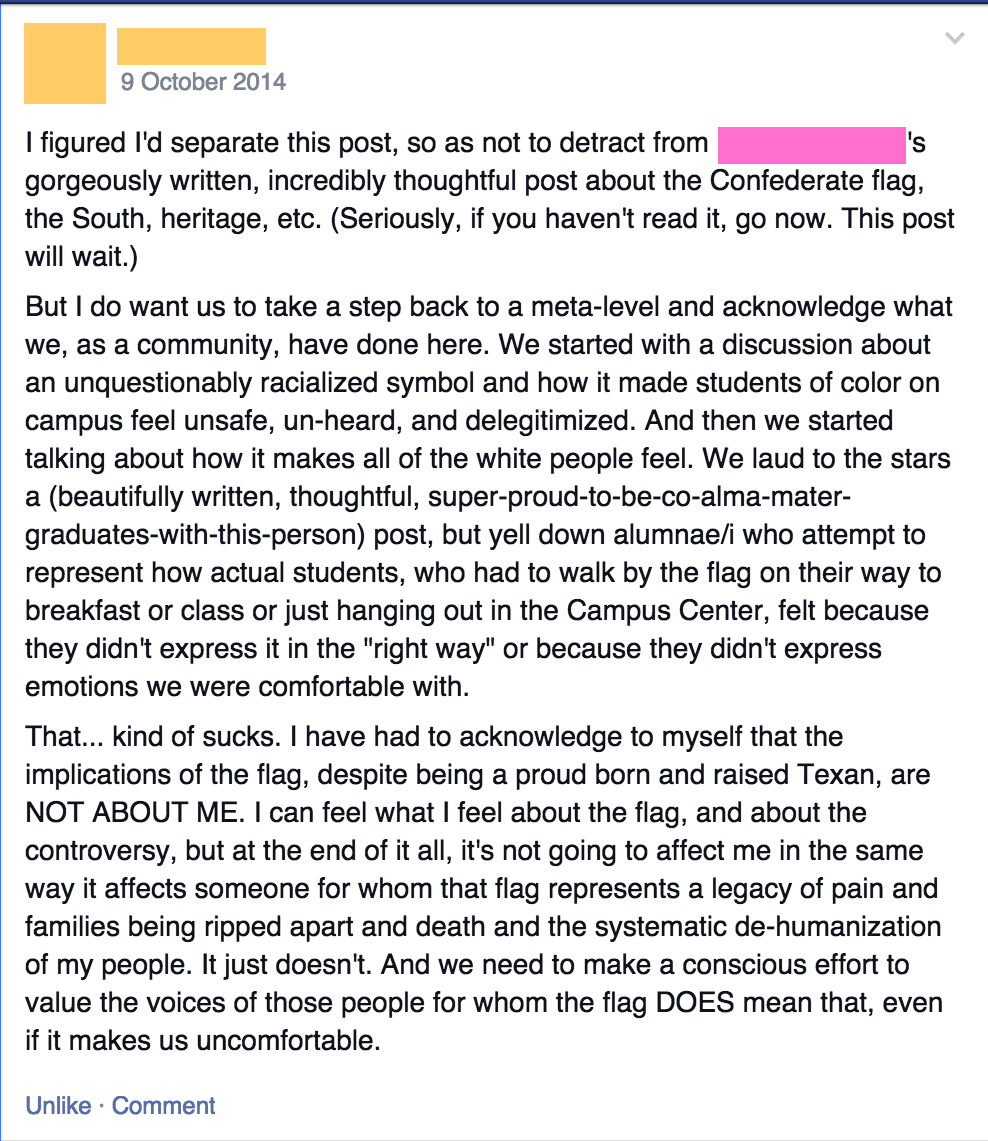February 1, 2015 - 13:52

I tend to think of BMC as pretty progressive, liberal, and generally a place sensitive to issues of diversity, so I was surprised that the Confederate flag / Mason-Dixon Line “incident” occurred at Bryn Mawr in particular. However, my focus is less on the actual incident(s?), but the follow up by alumni of the college and the impact on students both past and present.
Regardless of what happened on campus, I was perhaps even more taken aback by the commentary made by Bryn Mawr alums in a particular facebook group. Literally thousands of comments from alums (and a few comments from current students) poured in over a number of weeks. Throughout the process, some contributors claimed to have learned from the interactions. Having gone through almost all of them in the last few hours in order to write this, most commentary was less about the actual incident on campus, but instead internal argument, derailing chatter, insults, name-calling, and a hefty amount of thinly-veiled racism straying further and further from the original issue at hand. A few of these instances are detailed below:



Even posts attempting to get group members to focus were derailed almost instantaneously (purple is the third comment).


While the purple commenter in other circumstances might be making a fair point (to some extent), they are clearly derailing a message centering around POC in particular feeling unsafe, something that the pink commenter presumably attempts to point out. Overall, issues of POC safety and historic racism were routinely ignored in favour of nitpicking comments about “drama and bitchery” (real quote) and personal attacks or counter-attacks; primarily white voices drowned out the POC voices, and alums spoke over students. I will be the first to point out that this post is incredibly biased, and the majority of the helpful interactions are not being represented. That said, while some constructive commentary and overall positive / helpful interactions did happen, they were in the vast minority (I would estimate 3-5% of commentary at most), so you’re really not missing much, unfortunately.
To be fair, these opinions and actions aren’t surprising for the generic American population. However, as I perceive Bryn Mawr as a majority liberal-to-a-fault community slightly more aware of issues facing “diverse” students than the average rock, I had slightly higher hopes. However, this stung in particular because Bryn Mawr bills itself as a home, a family, a close-knit community that cares about each individual student from their first day onward, with an emphasis on the strength of the alumni network and Mawrtyrs supporting one another through graduation. And in many ways, Bryn Mawr as an institution, experience, place of learning, and shared experience does live up to its own standards of friendship, love, and caring; yet in others one’s expectations, fed by this reputation fueled by the institution and individuals within it, are routinely torn into pieces and subsequently set on fire. It’s unfortunate that such intense racism (among many other –isms) and unbridled hostility exists within a group of people gathered together to supposedly support each other.
In that way, perhaps Bryn Mawr and those who are educated within its walls resemble a family most, in that it contains people with whom you would normally not choose to associate with, but share a common trait—in this case an educational institution. And as such, the results are mixed.

Comments
facebook follow-up
Submitted by jccohen on February 2, 2015 - 15:05 Permalink
Mina,
I'm reading this out of context, of course, but must say that I'm somewhat thrown by where the conversation seems to be going (or how it is "derailed," as you put it). And I'm wondering how you understand this - do you see it as evidence of people/alums deliberately disrespecting the real or at least the original provocation here? is it yet another way that some folks (white, I'm guessing) take up the spotlight? and to what degree might this also be a function of social media as a form of communication? Or to put all this another way: Can you envision some circumstances under which this 'discussion' might actually be channeled into a real opportunity for communication? What would it take?